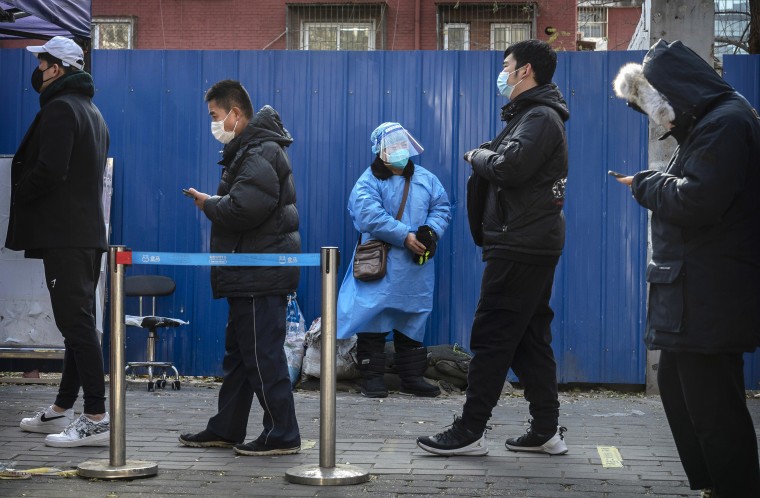Officials said Saturday that restrictions in parts of Xinjiang, including Urumqi, would be eased. But the tragedy struck a nerve with others who have been in lockdown across China, who saw it as something that could just as easily have happened to them.
Francis, a graduate student in the southwestern city of Chengdu, said he was eating at a hot pot restaurant on Wangping Street on Sunday when he heard chants outside of “We don’t want nucleic acid testing, we want freedom!” A video posted online and verified by NBC News showed other protesters in Chengdu chanting “Freedom of speech!” and “Freedom of the press!”
Seeing no move by police to disperse the relatively mild crowd, he and his friend followed it, said Francis, 23, who also asked to be identified only by his first name. He said some protesters held up blank sheets of paper, a silent form of protest used to evade censorship, while others lit candles.
“My feeling in this protest is that everyone is dissatisfied with the Covid prevention policy, less about expressing their anger towards the [Chinese Communist Party],” he said.
For hundreds of millions of Chinese, “zero-Covid” measures have meant restrictions on travel, sometimes-daily testing and the constant threat that they will be sent to government quarantine facilities or thrown into sudden lockdown. Those in lockdown have complained about lack of access to food and medicine, and the public has been outraged by the non-Covid-related deaths of people, including children, whose treatment was allegedly delayed by restrictions.
Though many people in China continue to support zero-Covid measures, they have also fueled growing resentment especially when combined with other grievances. Violent protests broke out last week near a factory in Zhengzhou that is the primary assembly site for Apple’s iPhone 14, where production has been slowed by the handling of a Covid outbreak, a labor shortage and disputes over pay.
Mindful of the growing public frustration and economic cost, Chinese officials announced an easing of quarantine and other measures earlier this month. But they emphasized that China was not abandoning “zero-Covid,” and restrictions quickly snapped back into place as the number of virus cases surged.

China’s National Health Commission reported 40,052 new cases nationwide on Monday, setting a record for the fifth day in a row. That is about the same number of cases being reported daily in the United States, which has a quarter of China’s population.
The Chinese government says it is saving lives with its “zero-Covid” strategy, arguing that it shows the superiority of Communist rule. While the U.S. has recorded more than a million virus deaths, the official toll in China is 5,232, a number that could rise exponentially if the fragile health care system is overwhelmed with virus cases.
The Chinese government’s success in minimizing the loss of life “is something to be acknowledged and to be credited,” Gao said. “No country in the world can do what China is doing.”
But China faces a “very painful” transition, Gao said, as it tries to minimize Covid deaths and infections while also keeping life as normal as possible. In addition to making anti-Covid measures more scientific and precise, Gao said, the Chinese government also needs to focus on increasing the vaccination rate, especially among older people.
“This is the time for all of us in China to really help out to overcome the difficulties and move in the right direction,” he said.
Jennifer Jett is the Asia digital editor for NBC News, based in Hong Kong.
Eric Baculinao , Janis Mackey Frayer , Dawn Liu , Hannah Lee , Angie Ling and Olivia Guan contributed .


